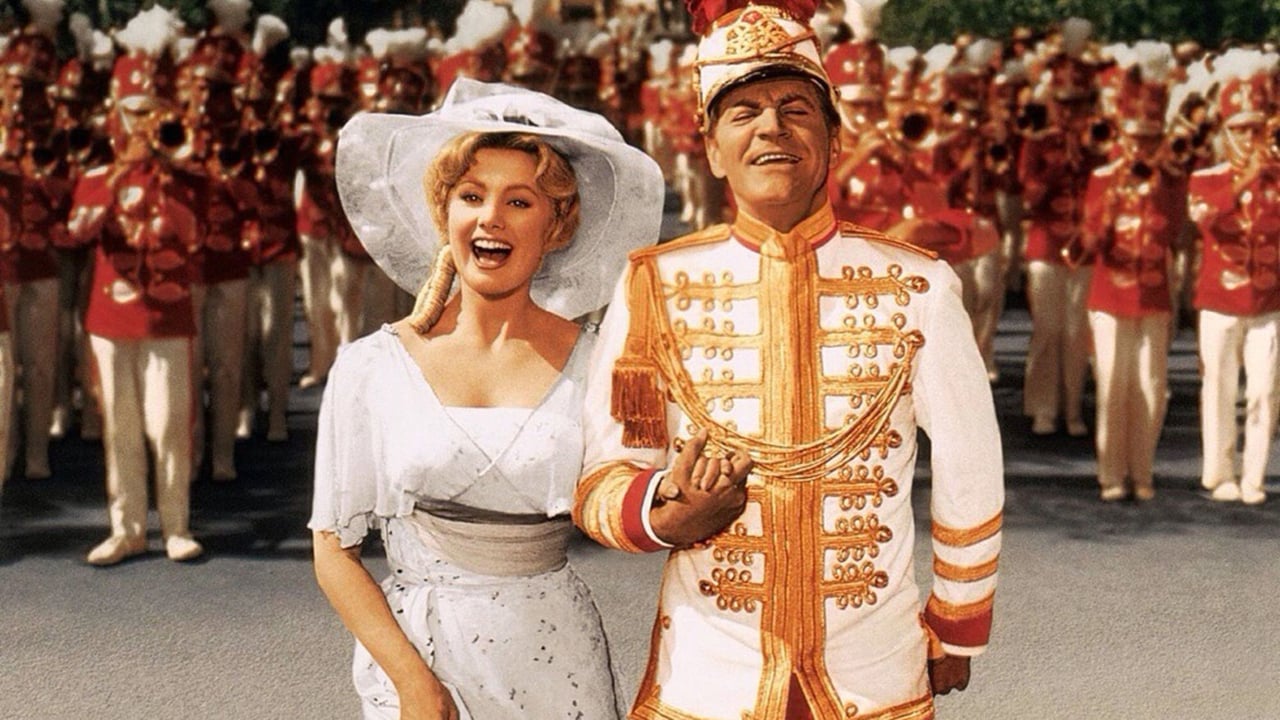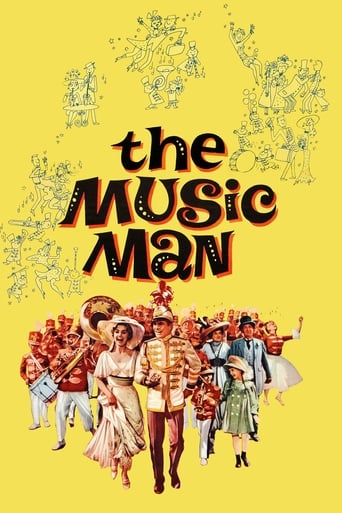SimonJack
Having watched this film a few times over the years, I've come to see it less for the musical bombast (of the score and the couple of scenes with a 76-trombone band at the end) and more for the talent of one person. After this recent viewing, I can see the deeper meaning – perhaps for the first time, that Shirley Jones explains as Marian Paroo. It wasn't the music that Professor Harold Hill brought – or didn't bring, to the town. It was the life he gave it in his upbeat, always positive demeanor. He was indeed, the consummate salesman. And, some would say, shyster. That helps to explain what I had seen before as a too sudden shift in Marian's attitude toward Robert Preston's character. She went from distrust and disdain to kindness and an almost syrupy liking for the man. But as the movie progressed, I could see what she was seeing – the change in the people. They had gone from quarrelsome, argumentative, sassy, abrupt, disdainful and downright nasty characters to a bunch of happy critters for the most part. Now, admittedly, Paul Ford as Mayor Shinn had to remain a sour puss almost to the end. That's who and what Paul Ford is in movies (and he was so kind and pleasant in real life). That all gives a nice moral undertone to the film. I suspect Meredith Wilson intended it all along. That is, that it's not a big thing to be taken by a con artist for a few hundred bucks if the con man otherwise brings some joy and happiness into one's life. So, the music man was really a purveyor of good feelings about oneself and one's neighbor, and a morale booster for the community. And, with that I've come to appreciate and admire Robert Preston that much more for his performance. Preston had never made a musical before, and I don't know how he got the lead for the part in the stage play. But thankfully, he got the lead for the film as well. And, he was 44 years old when Warner Brothers made this film. Yet, look at the energy he brings to the role. He could easily have been a fast-talking, back-patting character to play the role. He was somewhat that, but also a perky person with a smile and positive take on everything. Finally, he was most convincing just by the bounce and life he put in his steps and walk. Each time he had to go someplace, he took a couple of quick steps – much like many young people do when excited about going some place or doing something. It's like a short race to a door or porch, etc. So that's what Shirley Jones saw as Marian. And I'm convinced that Preston's role and performance truly carried this film to its success – and maybe the stage show as well. All of the performers did well, but for a major Broadway musical that made it to film, "The Music Man" didn't have any top tunes or many memorable songs. "Seventy-Six Trombones" is the only number that most people would know from this show. "Lida Rose" became popular over the years, especially with barbershop quartets. Meredith Wilson wrote the play and the music and lyrics for the whole show. He wrote some 40 songs in all, but only 18 were used in this film. The story is based on his hometown and the period in which he grew up in Mason City, Iowa. The time in the film is 1912, and that's the year that Mason City high school's band started. Wilson played piccolo in that band. Most people should enjoy this film. It's a look at small town America shortly after the turn of the 20th century.Here are some of my favorite lines from the film. For more samples of funny and witty dialog, see the Quotes section under the IMDb Web page of the movie.Harold Hill, "Could you kindly direct me? Which way is the center of town?" A man working in garden nods his head to the right and says, "Runs right down the middle of the street."Harold Hill, "You must realize that only one out of every 78 adults has a ganglion that reaches the ligature clear down to the apex. This automatically turns your entire face into an amazing embouchure." Mrs. Paroo, "Well, I never had a sick day in my life, Doctor."Harold Hill, "All of the really great cornet players were Irish – O'Clark, O'Mendez, O'Klein." Mrs. Paroo, "But professor, we are Irish." Harold Hill, "No? No, really? Well, that cinches it. Sign here, madam. Your boy was born to play the cornet… That'll be $7 earnest money."Marian Paroo, "The one thing one must remember, no matter who one is or what one is working for, one can do anything if one puts one's mind to it." Harold Hill, "Miss Marian, if one could only tell you how much you've done for one."Mayor George Shinn, "Not one poop out of you, madam." Eulalie Mackechnie Shinn turns to Zaneeta and says, "I think he means 'peep.'"Mayor George Shinn, "I settle your hash as soon as I get these premises off my oldest girl." (sic)Marian Paroo, "I've never met a man who sells anvils before." Anvil salesman, "Takes a real salesman, I can tell you that. Anvils have a limited appeal, you know."Harold Hill, "Oh, my dear little librarian. You pile up enough tomorrows and you'll find you've collected nothing but a lot of empty yesterdays."
alexanderasam
I really liked the production, and the moving camera, a rarity in film making in those days (I'm 60 so i grew up with these films) helps keep the film alive.Robert Preston was terrific. I love musicals and big films like this are a rarity, but the musical hasn't died -- it moved into the world of animation and to children's films... it resurfaces once in a while, with the spectacularCHICAGO...All the performers were delightful, though some overdrawn but Shirley Jones did a fine job as Marian...the credit goes to the screenwriter who apparently overhauled the Broadway play. I noticed that Ronnie Howard was listed in the movie...what a talented man he turned out to be.
bletcherstonerson
This review contains spoilers. The ending is brilliant. It is an intelligent, yet subtle statement on American consumerism. At the end, we see that the Town has bought the lie, they allowed themselves to be grifted and were so delusional and desperate to believe that their children weren't horrible musicians that we the viewer are witnessing a unified mass hysteria taking place. During this surreal moment, the uniforms that once were filthy rags, change to beautiful band outfits, and the band begins to play like John Sousa himself. The reason I reached this conclusion is that through out the film, we see no signs of magic, or fantasy, thus the ending is either done because they couldn't come up with an ending and whipped out a "magical anomaly", or this was a deftly crafted representation of the American citizen so willing to be lied to , and an examination at the happiness they feel when they buy a product and the weird yet fantastical reality that they then delve into after acquiring that product, believing their lives are better and now they are better than others. I gave this film a ten, because it is a classic, yet on a much deeper level than is comfortable for us to view openly.
richard-1787
This is a problematic movie.It has a collection of fine performances, and one - Robert Preston's incarnation of Howard Hill - that is simply off the charts, it's so good.It has some very impressive dance numbers.The costumes and sets are Technicolor fun.But this is a musical, and the music, with the exception of two outstanding numbers - Seventy-Six Trombones, Till There Was You - is completely and immediately forgettable.The Marian the Librarian number is a good example of the problems this causes. It's wonderfully choreographed, but despite all that great dancing and energy, it never really takes off, because the music is so uninteresting.It's a shame, really, as there is so much talent in this movie.If you're lucky, the energy and talent will make you forget that there's no substance to the numbers. And the two good numbers are, indeed, wonderfully done. Shirley Jones does full honors to Till There was You, and Howard Preston is a lot bigger - and better - than life in Seventy-Six Trombones.So, enjoy it for what it's worth. I just wish it were worth more.

